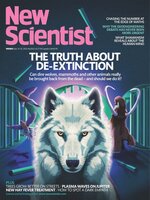New Scientist covers the latest developments in science and technology that will impact your world. New Scientist employs and commissions the best writers in their fields from all over the world. Our editorial team provide cutting-edge news, award-winning features and reports, written in concise and clear language that puts discoveries and advances in the context of everyday life today and in the future.
Elsewhere on New Scientist
A new dawn for astronomy • Seeing the first images from our new space telescope will be a moment to cherish
New Scientist
Fusion plans announced • A European consortium is beginning to design a commercial nuclear fusion power plant to be built by 2054, reports Adam Vaughan
US ruling may harm climate efforts • A decision by the US Supreme Court clarifies a long-running row about the role of the Environmental Protection Agency, says James Dinneen
Firms plan to clean up construction with net-zero concrete
Self-cooling quantum computer made of diamonds
Time loops may be easier to achieve than we thought
‘Fair’ AI looks at racial bias • Black homebuyers in the US could get a boost from AI decision-making
Intermittent fasting linked to improved gut function in mice
Molecular computer is extremely energy efficient
Brain electrodes may be long-lasting aid for depression
Largest of the water lilies • Victoria boliviana is the third known giant water lily – and the biggest
Floating buoy uses waves to power itself
We may know why some IVF embryos stop developing
Alien earthworms have invaded nearly all of North America
UK set to miss carbon goals due to failure to insulate homes
Dinosaurs’ ability to survive cold helped them rule the planet
AI predicts crime a week in advance • The location of crimes could be accurately predicted, but bias concerns persist
Implantable device blocks pain by chilling nerves
Alternative CRISPR tool may be better way to edit genes
The ‘human climate niche’ may shrink drastically this century
The risks from covid-19 reinfection • A study has found that people who catch the coronavirus two or three times go on to have higher rates of everything from heart disease to kidney disorders, reports Michael Le Page
Dogs related to two groups of wolves
Structures take shape in mid-air
Faecal swap offers hope of lasting relief from IBS pain
Really brief
A grassroots movement • Seagrass meadows are vanishing at a rate of 7 per cent a year. Restoring them would be a huge conservation win, says Sophie Pavelle
Field notes from space-time • Space for intuition When it comes to the complexities of space-time, intuition comes in different ways, depending on the level of science you have access to, says Chanda Prescod-Weinstein
Out of this world
Your letters
Into Chernobyl’s exclusion zone • An extraordinary window onto the area around the devastated nuclear power plant reveals a “land of tranquillity and frozen time”, finds George Bass
Worlds apart • Animals have amazing inner lives we barely grasp. A powerful new book explains why this matters, says Anna Demming
Don’t miss
The film column • When lightning strikes A gentle fantasy about a lonely inventor called Brian, whose world changes completely when a robot he creates comes to life, makes a serious point about the possibilities of personal robots, finds Simon Ings
THE COSMOS AS WE’VE NEVER SEEN IT BEFORE • The James Webb Space Telescope has the power to unravel some of the biggest mysteries of the universe. Here are some of the cosmic wonders it will look at first, says astronomer María Arias
Expect the unexpected
“I call it the good ancestor...

 Jul 26 2025
Jul 26 2025
 Jul 19 2025
Jul 19 2025
 Jul 12 2025
Jul 12 2025